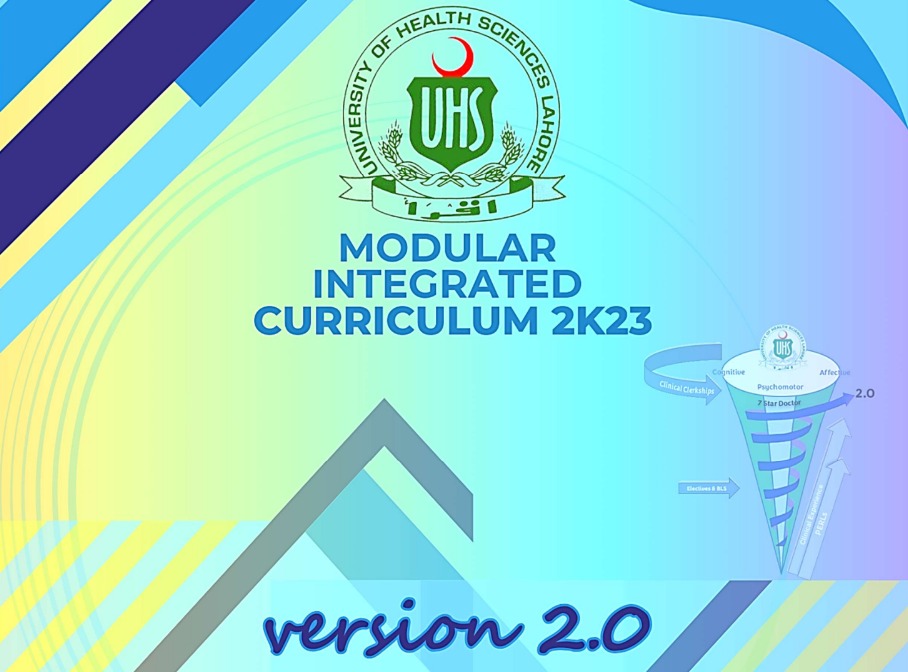Curriculum

The curriculum designed for MBBS at RLMC is based on PM & DC & UHS guidelines and structured to ensure success in the field of medicine. The curriculum is aimed at professionalism and medical ethics by application of knowledge and skills. The focus of the program is to produce competent, self-directed, committed and life-long learners who will be able to serve the community empathetically.
Modular Integrated MBBS Curriculum
Internal Assessment
Continuous internal assessments shall result in student evaluation at the end of each year, namely assignment:
-
Stages/sub-stages
-
Class tests
-
Attitudinal assessment by the faculty
-
Clinical skills assessment by clinical supervisors
Recorded within the yearly Logbook, will be an important reflection of a student's performance.
Term Tests and Send-up assessment are also important components of the internal assessment.
Assessment of Knowledge, Skills and Attitude shall also contribute towards the internal assessment. Methods used to assess these domains shall include Multiple Choice Questions of one-best type, Short Essay Questions, Oral Viva, and Practical/Clinical Examinations.
The weightage of internal assessment shall be 10% in all subjects (5% internal assessment marks shall be added to the aggregate score of Theory and 5% internal assessment marks to aggregate score of Oral and Practical Examination and not to an individual component like MCQs, SEQs Paper or Oral / Practical / Clinical Examination).
The score of internal assessment shall contribute 10% and the university examination of each subject shall contribute to 90% of the total score.
-
Send Up examinations 4-6 weeks before the annual university examination shall be compulsory for students of all classes, those who do not appear or fail in the examination will be regarded as students whose courses of instructions are incomplete and unsatisfactory and will not be allowed to appear in the university professional examination for promotion to the next higher class.
-
Pass percentage for Send Up examinations is 50%.
-
Awards of internal assessment in all the subjects of all the candidates shall be submitted to the Controller of Examinations along with the Admission Forms for the professional examination.
-
Internal assessment received after commencement of the final examination shall not be accepted.
-
The marks of internal assessment shall be submitted only once a year prior to annual examination and the same shall be counted both for annual and supplementary examinations.
-
It is further emphasized that fresh assessment or a revision of assessment for supplementary examination shall not be permissible. Proper record of continuous internal assessment shall be maintained by respective departments of the medical college.
-
Internal assessment awarded in a particular year may not be decreased subsequently detrimental to the candidate.
Outcomes of the Five Year MBBS Programme:
By the end of five-year MBBS Program, our graduate will be able to demonstrate:
1. Application of knowledge
Apply biomedical scientific principles, methods following knowledge to medical practice and integrate these into patient care and clinical decision-making.
2. Professionalism
Apply their knowledge and skills in a competent, ethical and professional manner and taking responsibility for their own actions in complex and uncertain situations.
3. Communication and Interpersonal skills
Communicate effectively, openly and honestly with patients, their relatives, and with colleagues and maintain patient confidentiality.
4. Diagnosis and medical management
Perform a range of diagnostic, therapeutic and practical procedures safely and effectively and identify, according to their level of skill and experience, the procedures for which they need supervision to ensure patient safety.
They must prescribe medications safely, appropriately, effectively and economically and be aware of the common causes and consequences of prescribing errors.
5. Leadership and Teamwork
The college encourages development of student’s well-being in leadership and team building. We conduct workshops on personal growth and empowerment.
The focus is on whole well-being of faculty and student with acquisition of leadership skills.
6. Health promotion and illness prevention
Apply the principles, methods and knowledge of Public health and apply the principles of public health for improvement of health and sustainable healthcare.
They must be aware of use advocacy and public awareness in disease prevention.
7. To promote practice of evidence based Medicine:
Demonstrate and promote practice of Evidence based medicine as is being done all over the world.
8. Clinical research and scholarship
Apply scientific method and approach to medical research and integrate these with a range of sources of information used to make decisions for care.
